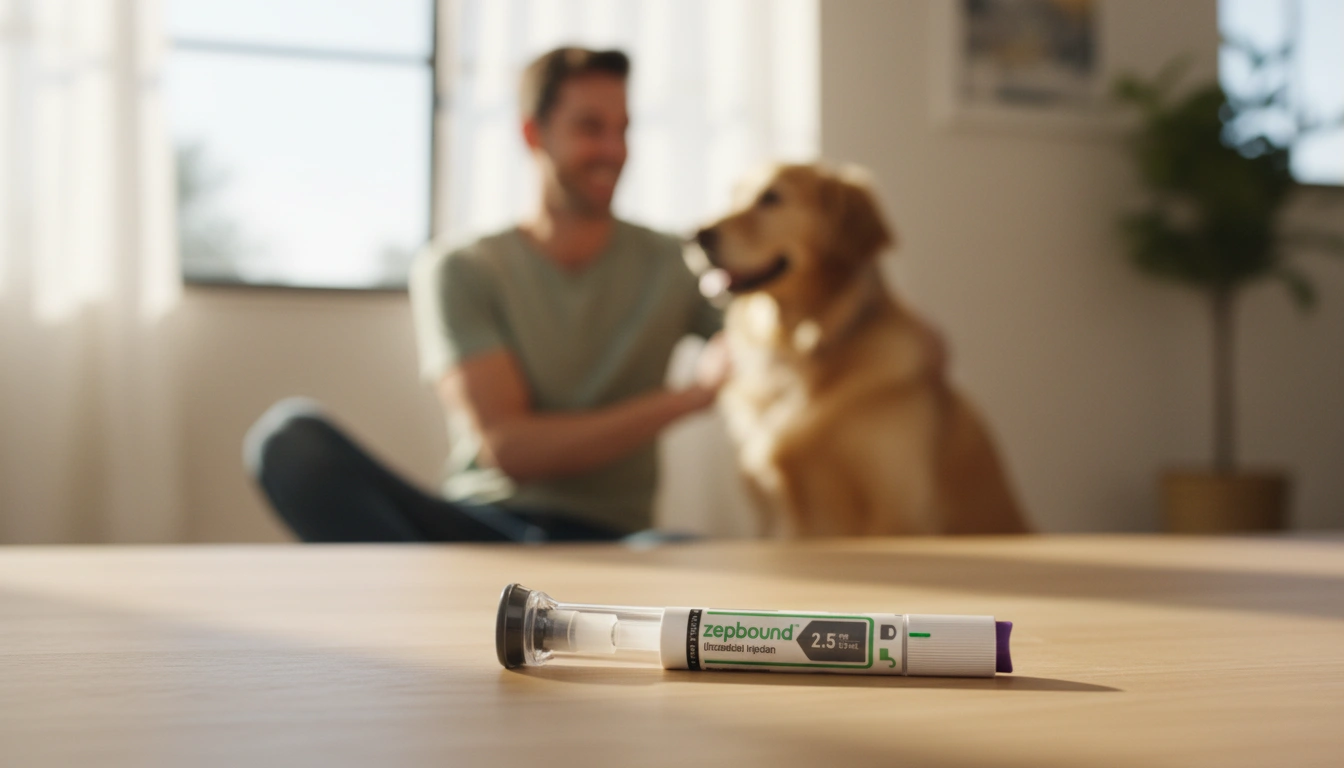How to Maintain Muscle on Zepbound: Strategies for Success

Introduction
In the rapidly evolving landscape of weight loss solutions, medications like Zepbound are making headlines for their effectiveness. However, as we embark on this journey to healthier living, we may find ourselves asking, how can we maintain muscle while using Zepbound? This question is crucial, as muscle preservation plays a vital role in our overall health, metabolism, and physical capabilities.
Zepbound, a medication that targets both the glucagon-like peptide-1 (GLP-1) and glucose-dependent insulinotropic polypeptide (GIP) receptors, has shown impressive results in aiding weight loss. But with rapid weight loss comes the concern of losing lean muscle mass. Our muscles are not just for show; they are essential for supporting everyday activities, maintaining a healthy metabolism, and even regulating our mood. Therefore, understanding how to maintain muscle while utilizing Zepbound is not only relevant but essential for achieving sustainable weight loss.
In this blog post, we will explore the intricacies of muscle maintenance during weight loss, particularly when using Zepbound. We will delve into the mechanisms of muscle loss, effective strategies to preserve muscle mass, and the importance of a well-rounded approach that includes nutrition and exercise. By the end of this article, you’ll have a comprehensive understanding of how to effectively maintain muscle while on Zepbound, ensuring that your weight loss journey is both successful and healthy.
What You’ll Learn:
- The relationship between weight loss and muscle loss.
- How Zepbound impacts muscle mass and composition.
- Effective dietary strategies to preserve muscle during weight loss.
- The role of exercise in maintaining muscle mass while using Zepbound.
- Lifestyle changes that can support your muscle maintenance goals.
Let’s embark on this journey together, ensuring that we not only achieve our weight loss goals but do so in a manner that supports our overall health and well-being.
Understanding the Weight Loss and Muscle Loss Connection
The Science Behind Weight Loss
Weight loss occurs when we create a caloric deficit, meaning we consume fewer calories than our bodies expend. While this may lead to fat loss, it often results in the loss of lean muscle mass as well. This phenomenon is particularly concerning for individuals using weight loss medications like Zepbound, as rapid weight loss can exacerbate the loss of muscle tissue.
Research indicates that individuals with obesity often have a higher muscle mass than those with a healthy weight. However, the muscle tissue in these individuals may be compromised due to fat infiltration, leading to reduced strength and mobility. When weight loss occurs, particularly through calorie restriction, muscle loss can significantly affect overall body composition and metabolic health.
The Impact of Zepbound on Muscle Mass
Zepbound works by mimicking the actions of GLP-1 and GIP hormones, which are involved in regulating appetite, insulin secretion, and fat storage. While Zepbound is effective for weight loss, it is essential to understand how it may affect muscle health. Studies have suggested that weight loss induced by GLP-1 agonists like Zepbound may lead to a reduction in muscle volume, although the overall impact on muscle quality could be positive.
The loss of muscle mass is a common concern among users of Zepbound. It’s important to note that while some muscle mass loss is expected during weight loss, the goal is to minimize this loss and preserve lean muscle tissue as much as possible. By understanding the mechanisms at play, we can adopt strategies to counteract muscle loss during our weight management journey.
Effective Dietary Strategies for Muscle Preservation
Emphasizing Protein Intake
One of the most effective ways to maintain muscle mass while losing weight is to increase protein consumption. Protein is essential for muscle repair and growth, and adequate intake can help mitigate muscle loss. Aiming for a protein intake of 1.0 to 1.2 grams per kilogram of body weight daily can be beneficial. For example, if you weigh 150 pounds (approximately 68 kilograms), your goal should be around 70 to 80 grams of protein each day.
Incorporating high-quality protein sources such as lean meats, fish, eggs, dairy products, legumes, and plant-based proteins into your meals can help you reach this target. Additionally, supplementation with whey protein or essential amino acids can further support muscle protein synthesis, especially for those who may struggle to meet their protein needs through food alone.
Nutrient Timing and Meal Planning
Meal timing can also influence muscle preservation. Consuming protein-rich meals or snacks throughout the day, particularly after workouts, can enhance muscle recovery and growth. Planning your meals to include a balance of protein, healthy fats, and carbohydrates can help sustain energy levels and support muscle health during your weight loss journey.
Staying Hydrated
Hydration is often overlooked but plays a crucial role in overall health and muscle function. Dehydration can lead to decreased performance in workouts and impair muscle recovery. Aim to drink plenty of water throughout the day, especially before and after exercise, to keep your body functioning optimally.
The Role of Exercise in Muscle Maintenance
Resistance Training
Incorporating resistance training into your exercise routine is one of the most effective ways to preserve and even increase muscle mass while losing weight. Engaging in strength training at least two to three times a week can help stimulate muscle growth and combat the muscle loss that can accompany weight loss medications like Zepbound.
Exercises such as weight lifting, bodyweight training, or resistance band workouts can effectively build muscle and enhance strength. Focus on compound movements that engage multiple muscle groups, such as squats, deadlifts, bench presses, and rows.
Cardiovascular Exercise
While cardiovascular exercise is essential for burning calories and promoting heart health, it’s important to balance it with resistance training to prevent excessive muscle loss. High-intensity interval training (HIIT) can be an effective way to combine cardio with muscle preservation, as it allows for a shorter duration of exercise while still promoting fat loss and muscle maintenance.
Flexibility and Mobility Work
Incorporating flexibility and mobility exercises into your routine can also support muscle health. Activities like yoga or stretching not only enhance flexibility but can also aid in recovery and reduce the risk of injury. This is particularly important for those engaging in strength training, as maintaining a full range of motion can improve performance.
Lifestyle Changes to Support Muscle Maintenance
Setting Realistic Goals
Setting realistic and achievable weight loss goals is crucial for maintaining muscle mass. Rapid weight loss can lead to significant muscle loss, so aiming for a gradual weight loss of 1 to 2 pounds per week is a more sustainable approach. This allows your body to adapt and helps preserve lean muscle tissue.
Monitoring Progress
Regularly monitoring your progress can help you stay accountable and make necessary adjustments along the way. Keep track of your weight, body measurements, and strength levels to ensure that you are preserving muscle mass while losing fat. If you notice a significant loss of muscle, it may be time to reassess your diet and exercise routine.
Seeking Support
Engaging with a healthcare provider or a registered dietitian can provide valuable insights and personalized recommendations tailored to your needs. At TrimRx, we believe in the power of individualized support, which can make a significant difference in your weight loss journey. Taking our free assessment quiz can help you determine your eligibility for personalized weight loss solutions that account for muscle preservation.
Conclusion
As we navigate the journey of weight loss with Zepbound, maintaining muscle mass should be a priority. By understanding the mechanisms of weight loss and muscle loss, we can implement effective dietary strategies, engage in regular exercise, and adopt lifestyle changes that support muscle preservation.
Together, we can embrace a holistic approach to weight management that not only fosters weight loss but also nurtures our muscles, ensuring a healthier, more sustainable outcome. Remember, the goal is not just to lose weight but to achieve a healthier, stronger version of ourselves.
FAQ
How much protein should I consume while on Zepbound?
Aim for 1.0 to 1.2 grams of protein per kilogram of body weight daily to help preserve muscle mass.
What type of exercise is best for maintaining muscle while losing weight?
Resistance training is crucial for muscle preservation, complemented by cardiovascular exercise and flexibility work.
Can I take supplements to help maintain muscle mass?
Yes, protein supplements, such as whey protein, and essential amino acids can support your muscle maintenance goals.
How can I monitor my muscle mass during my weight loss journey?
Regularly track your weight, body measurements, and strength levels to assess muscle preservation.
What should I do if I experience significant muscle loss while on Zepbound?
Consult with a healthcare provider or registered dietitian to reassess your diet and exercise regimen, ensuring you have a balanced approach to weight loss and muscle maintenance.
For those looking to begin their journey with Zepbound, we encourage you to take our free assessment quiz here to see if you qualify for a personalized weight loss program. Additionally, consider our quick-access supplements like GLP-1 Daily Support or Weight Loss Boost to enhance your weight loss journey. Together, we can achieve your health goals!

Transforming Lives, One Step at a Time
Keep reading
Navigating Your Path: How Many Doses Are In Zepbound and What It Means for Your Health Journey
Curious how many doses are in Zepbound? Discover its weekly dosing schedule, available strengths, and titration process for effective weight loss. Learn more!
Navigating Your Zepbound Journey: Understanding Dosing and Expert Guidance
Wondering how to split doses of Zepbound? Learn why it’s unsafe & not recommended. Get expert guidance on Zepbound dosing for safe, effective weight loss with TrimRx. Click to learn more!
Understanding Zepbound Dosing: What is the Lowest Dose Available for Your Weight Loss Journey?
Curious what is the lowest dose of Zepbound available? Learn about Zepbound’s 2.5mg starting dose, titration, and safe use for weight loss. Get expert guidance!



